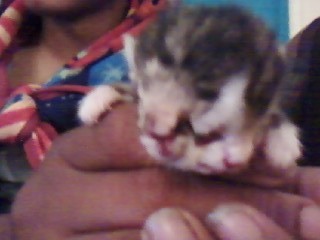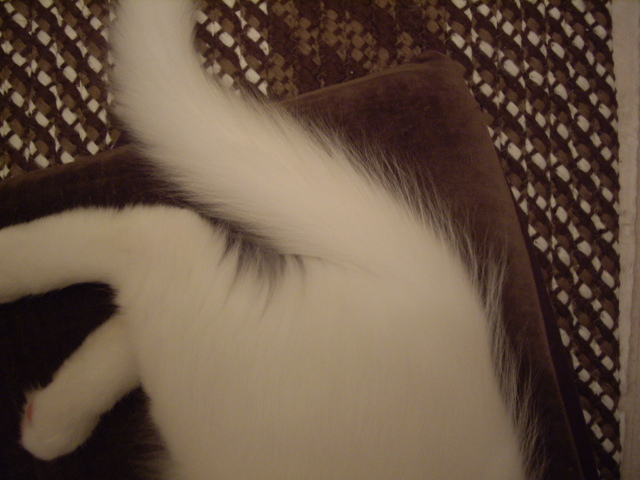QuestionHi, Becky:
I have a 3 year old Cornish rex and about 6 months ago, she began vomiting after eating. Not every time, but fairly frequently. This has gradually increased over time and we have changed her food, taken her to the vet, warmed her food, fed her slowly, etc. At this point, feeding her is an all day event, as the only way to keep her from vomiting is to feed her about a fourth of a teaspoon of wet food every half hour. I should note that she is very hungry and meows constantly because she wants more food. The vet says she's probably allergic to something in the food and we just have to experiment until we find the right food. I think he's wrong. Are cornish rex prone to any stomach problems? Any advise would be appreciated!
AnswerSusan,
I'm sorry I took a while to get back to you. I do not normally answer vet questions or questions concerning pedigreed cats. But regarding your poor kitty I contacted a friend, and a knowledgeable lady, who has worked with a vet for 17 years and who has a website
(www.Dogandcathealth.info) which deals with pedigreed cat health information among other things. I posed the problem to her about your cat's vomiting and she was nice enough to send a reply to forward to you:
"No. Cornish Rex are very healthy and free of known genetic disorders. The Devon Rex is a bit fragile but not the Cornish although it looks it.
I think she needs a referral to a gastrointestinal or internist specializing in gastrointestinal problems. A three year old cat that is vomiting that much for that long needs testing..Feeding a allergen diet is a good idea however in any cat that is chronically vomiting. It should be a protein source the cat has not had before..most large pet stores do have Duck, venison and other allergen diets. She did not actually say that she followed her vets recommendations or the foods she tried. If the cat is not itchy food allergies are less likely but an allergen diet still may be the best choice until she sees a specialist. With vomiting we just go through some elimination steps and don't skip them...you just don't want to have to backtrack and redo. Can't hurt- may help.
There are many causes of chronic vomiting in cats and food allergy is only one of them. If experimenting with her food has not helped in six months, this cat needs tests to see whats going one. It can be expensive and frustrating to try to find out why a cat is vomiting.
The most common causes of vomiting in cats are probably inflammatory bowel disease, cholangiohepatitis, pancreatitis, cancer, kidney disease,
hyperthyroidism and heartworms. There are many other causes, including parasites, mechanical obstructions (hiatal hernias, esophageal strictures,
etc) and infectious diseases.
"In a cat that started vomiting at a young age there are several things we try to eliminate early in the diagnostic process. We check fecal samples looking for worms and other parasites, treating what we find. We routinely deworm cats, even if we don't find worms on a fecal exam. Once in a while this seems to help. The new dewormers are pretty safe and we think this is a reasonable first step for many cases of vomiting, even chronic ones, if it hasn't been done previously. Then we try to eliminate food allergies by
trying a food trial for 6 to 8 weeks. This consists of a diet with a
protein source that the cat has never eaten before. We use lamb, venison,duck or similar protein sources to try to find something that the cat hasn't had in its diet (beef, chicken and tuna are common in cat foods).
This works often enough that we think it is worth trying in most cases, too. Sometimes we continue to try dietary changes, adding fiber the diet or using highly digestible diets to see if we can control vomiting in that manner. This helps more often with diarrhea than with vomiting, though. After that, diagnosis and treatment gets a little more complicated. A general chemistry panel and cbc should be run to make sure that there isn't organ damage leading to the vomiting. There usually isn't but you don't want to miss something like this. If this is normal a decision has to be made as to whether to try to treat for vomiting without a diagnosis or to try to get a diagnosis and then treat. The reason this choice is difficult is that the best way to find out what is going on is to get biopsy samples from the intestinal tract, which is usually done with an
endoscope. It is somewhat expensive to do this and cats have to be
anesthetized. Most vets have to refer patients to a specialist for this. For these reasons, many clients and/or vets prefer to try treating for inflammatory bowel disease rather than attempting to make a definitive diagnosis. We use both approaches.
We use metronidazole long enough to see if it helps. Usually ten days is long enough to get a good idea if the cat is vomiting more than two or three times a week. If it does help but the problem returns when the medication is stopped, then it becomes more likely that inflammatory bowel disease (IBD) is present. At that point we may try using prednisone or injectable corticosteroids to see if they will control the vomiting on a more long term basis. This is a compromise at this point --- corticosteroids have enough side effects that it is a lot more reassuring if there is a diagnosis before they are used long term. On the other hand, we have used prednisone on an every other day basis for 30 to 60 days in a
number of cats whose IBD seems to disappear and not return or to return after a long interval."
So I think it a cat problem and her vet is just taking to long to refer. Stuck on his diagnosis and the cat is not improving so she needs to push for a referral."
I hope this answer was what you were looking for. My personal opinion is that you should get get another vet and get a 2nd or even 3rd opinion! I hope you find the problem and that your kitty is much better soon.
Carol

 What is the breed of my cats
Question
1st
Hello Ali
Thanx for giving us time to get
What is the breed of my cats
Question
1st
Hello Ali
Thanx for giving us time to get
 my cat had a kitten with one head and part of another with a mouth and has not nursed since she was born.
Question
my newborn kitten
my cat delivered a female ki
my cat had a kitten with one head and part of another with a mouth and has not nursed since she was born.
Question
my newborn kitten
my cat delivered a female ki
 my cat!
QuestionQUESTION: I recently e-mailed a question to you
my cat!
QuestionQUESTION: I recently e-mailed a question to you
 giardia coccidia
Questionthin, spiny guard hair
QUESTION: I took
giardia coccidia
Questionthin, spiny guard hair
QUESTION: I took
 testosterone replacement for neutered male cat
Question
Monkey riding on dads Monkey sleeping h
testosterone replacement for neutered male cat
Question
Monkey riding on dads Monkey sleeping h